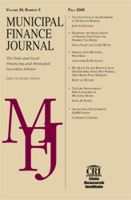Complete Issue (Vol 40, No 4 & Vol 41, No 1)
Author: W. Bartley Hildreth.
Source: Volume 41, Number 01, Spring 2020 , pp.1-155(155)

< previous article |return to table of contents
Abstract:
The National Federation of Municipal Analysts is the United States’ leading association of market analysts. The Municipal Finance Journal has published edited proceedings from the NFMA’s annual conferences since 1992, and we are pleased to present panels from the NFMA’S 36th Annual Conference, held in Charleston, South Carolina, from May 7 to 10, 2019. The conference proceedings are being published in a special double issue of Municipal Finance Journal, as Volume 40, Number 4 and Volume 41, Number 1. Market conditions are influenced by policy activity in Washington. NFMA president Kurt Forsgren opens the conference and introduces the keynote speaker David Wessel. As a well-known former Wall Street Journal economics reporter who is now at the Brookings Institution, Wessel shows the depth of his insights through a scan of the economic landscape and its impact on state and local governments. His faith in our economic resilience is heartening, but he expresses caution in the new thinking that the federal government can spend endless amounts of money with little impact. State and local government finance was affected by the Tax Cuts and Jobs Act of 2017. Market analyst Marshall Kitain recaps the main changes in the law and moderates a panel of market and political leaders. Mayor Steve Benjamin highlights the need for tax policy that helps address infrastructure needs, especially in areas experiencing migration growth. Portfolio manager Ann Ferentino specifically addresses the impact of the state and local tax deduction limit. Jamie Doffermyre explores the influence of tax law on the supply and demand of municipals from his vantage point as a manager of institutional and retail municipal sales. Separating the “myths” from the law of securities disclosure is the subject of the panel moderated by institutional investor Scott Andreson. Disclosure counsel Dan Deaton, grounded in corporate disclosures, speaks to first principles legal analysis. Peg Henry adds insights on several topics, including direct placement disclosures, based on her general counsel experience as a former municipal regulator and now with an investment banking firm. From his role as a municipal investment banker, Brad Gewehr discusses the workflow in developing the credit story disclosures. Difficulties are noted by investment banker Steve Heaney. After addressing certain disclosure myths, the panel calls for clarity in the different work “lanes” of the issuer’s finance director, the investment banker, bond counsel, and underwriter’s counsel, among others. Portfolio manager Brent Miller asks “What Infrastructure Crisis?” In response, Brian Pallasch, representing the American Society of Civil Engineers, details the oft-cited infrastructure report card and its annual call for more attention to the reality of an infrastructure crisis. Infrastructure researcher Debra Knopman echoes those concerns, especially concerning surface transportation and water sectors. The panel explores climate change, resilient structures, funding challenges, and market disclosures. Traditional approaches to analyzing municipal credit may not serve today’s needs. Credit analyst Andy Shin shines the light on the root causes, which are political in nature. Political science professor Daniel DiSalvo confirms the point with his study on the political determinants of legacy costs such as pensions and retiree healthcare, with unionization being a major factor. Adding further evidence is policy and political science professor Sarah F. Anzia. This panel highlights the need to focus on political incentives and the willingness, not just the ability, to pay debt obligations. Tender option bonds are a structured product created by an investment fund after depositing municipal bonds into a trust, which then issues floating rate instruments with the residual going back to the fund. Panel moderator and money market manager John Vetter represents the floater holder, Steven M. Hlavin represents the portfolio manager/residual holder, and a second panelist represents the public finance banker. The three provide a deep dive into the structure, the incentives of the various parties, the regulatory situation, risk-value considerations, and recent transactions. A professional development panel moderated by portfolio credit analyst Nicole Byrd explores the use of relative value and financial modeling in credit analysis. Chief executive John Mousseau provides an in-depth overview of relative value. The ingredients of relative value and financial modeling are detailed and explained using actual examples. We are pleased to offer the edited transcripts of this important conference to a wider audience.Keywords: U.S. Federal Debt; Tax Reform and the Municipal Market; Municipal Disclosure Myths; Municipal Credit Analysis; Infrastructure Crisis; Tender Option Bonds; Relative Value;Financial Modeling
Affiliations:
1: Editor in Chief.